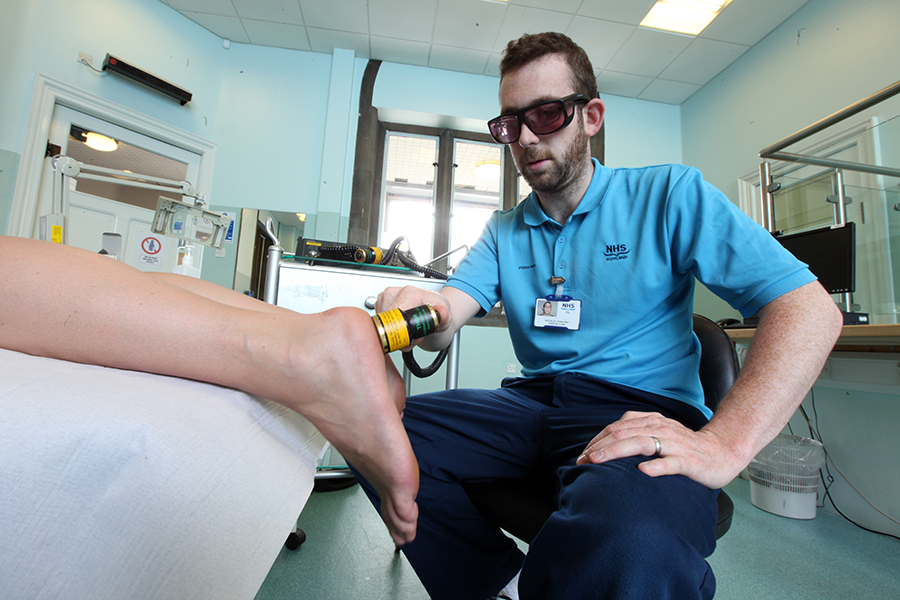How to become a podiatrist
To become a podiatrist in the NHS, you must complete a pre-registration undergraduate degree programme approved by the Health and Care Professions Council (HCPC).
What is a podiatrist?
Podiatrists diagnose and treat a wide range of mobility and medical conditions of the feet and lower limbs. They help to improve a person’s movement, independence, and quality of life.

Starting your career as a podiatrist
Choosing subjects at school
To get on a course that could lead to a career as a podiatrist, useful subjects include:
- Human Biology
- Physics
- Chemistry
- Care
- English
- Maths
Speak to your guidance teacher about subjects offered at your school.

Work placements and volunteering
You may find it helpful to get some healthcare experience by doing a work placement or volunteering. You’ll get training, increase your knowledge, and learn new skills. This could help you when applying to university, college or a new job with NHSScotland.
Education and training pathway
Most universities accept a wide range of qualifications, giving you the option of applying directly from school or going to college first.
If you choose to go to college, you could do an HND in Applied Biological Science or Applied Sport Science.
Widening access
Widening participation supports adult learners who want to go to university. If you’re an adult with few or no qualifications, you could get into higher education through the Scottish Wider Access Programme (SWAP). Many universities also provide access programmes to help you get the degree entry qualifications you need.
Podiatry pre-registration undergraduate degree programme
In Scotland, 2 universities offer undergraduate programmes in Podiatry approved by the HCPC:
- Glasgow Caledonian University
- Queen Margaret University
Pre-registration undergraduate programmes take 4 years full-time.
You should contact individual universities to find out about specific entry requirements.
After graduation, you must register with the HCPC. You can then apply as a newly qualified podiatrist for vacancies in the NHS.
Get to know the role
As a podiatrist, you'll diagnose and treat a wide range of mobility and medical conditions that affect the foot health of people of all ages. These include:
- arthritic conditions
- skin conditions
- diabetes
- heart and blood disorders
- disorders of the nervous system
- sports injuries to the foot and lower limb
Tasks include:
- provide advice on foot care
assess the gait patterns of patients with biomechanical problems and sports injuries to the foot and lower limb - specialise in the treatment of ‘high-risk’ patients within hospital departments, including vascular and rheumatology outpatient units and renal wards
- provide insoles, padding, or supports to relieve foot arch or heel pain
- assess people with diabetes who may have circulation problems
- minor foot surgery, including nail and minor soft tissue surgery
- treat ingrown toenails or fungal nail infections
- supervise students and healthcare support workers
You'll need these skills:
- caring
- teamwork
- communicating
- problem-solving
- persuading and motivating people
- leadership
Podiatrists work with other healthcare professionals, including:
- physiotherapists
- dietitians
- orthotists
- podiatric surgeons
- doctors
- nurses
- healthcare support workers
You could work in:
- health centres
- a person’s home
- nursing homes
- hospitals
Learning and development
During your career, you’ll be expected to keep your skills and knowledge up to date through Continuing Professional Development. The Royal College of Podiatry (RCPod) offers:
- training courses
- conferences
- seminars
Visit the RCPod website for more about training and CPD courses.
Career progression
With training and experience, you may choose to specialise in a particular area of practice such as:
- sports injuries
- critical care
- care of the elderly
- working with children
- caring for cancer patients
- podiatric surgery
You could also progress to advanced or consultant podiatrist roles. As head of a podiatry service, you would manage a budget and a team.
There are also teaching and research opportunities.
Professional bodies
When you become a qualified podiatrist, you must register with the HCPC to work in the NHS. You can also join the Royal College of Podiatry.
Navigate page

You can be an AHP
Discover the range of AHP careers you can choose in the NHS.
Allied health professions
NHSScotland Careers blog
Our blog includes how-to guides, case studies, and career resources.
Discover more